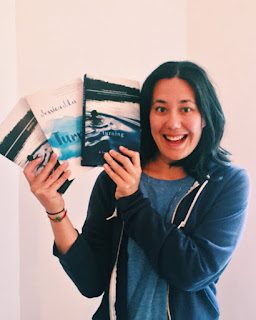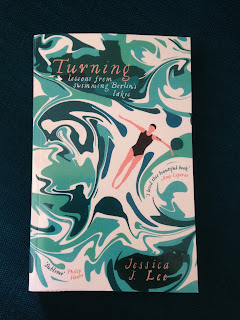In conversation with... Jessica J. Lee
Hi Jessica! First of all, I would like to congratulate you
on the UK paperback publication of Turning. Can you please briefly tell us what it
is about?
A: Thanks for having me! Turning is a nature memoir following a year I spent swimming lakes in and around Berlin. It’s a hybrid work of swimming writing, landscape history, limnology, and personal memoir, among other things. Or, as some people like to tell me, it's about being a somewhat mad woman swimming: hammering my way into frozen winter lakes, taking dips amidst dark histories, and trying to find a way to feel at home in a new place.
Turning has now been published in Canada, in Germany and in the UK with different covers. Do you have a favourite?
A: I couldn't possibility pick a favourite cover, because I think they all capture something integral to the book, but I will say, when I saw both the UK paperback and the Canadian covers (both illustrations) my heart skipped a beat.
I am a translator at heart so I am curious about your level of involvement with the translation of your book in German. Did you have any contact with the translators who gave you a voice in a foreign Language?
A: I had a bit of contact, though I tried not to bother the translators too much. It's a bit nerve-wracking, sending your work out for someone to render in new words, but I was honestly so impressed with how it came together. Admittedly, I find it uncanny to read from the German edition, as I occasionally do at readings in Germany, because the vocabulary of the translation is just so much better than my rather dreadful German!
Do you think that there are similarities between swimming and language learning? That, somehow, the fear of the unknown hidden beneath the surface of a lake or behind a world described with unfamiliar words can only be overcome by full immersion?
A: Definitely – one of the things I thought about a lot while I was swimming was the feeling of always being at a border, both linguistically and in the water. I studied German in university but that really didn't prepare me for actually speaking it in the world, so my early days in Berlin, which I spent swimming, were also about habituating myself to a new language. The same way I acclimatised to the movement and temperature of the water, I settled into German.
I have felt a sense of peaceful solitude when reading of your swims on your own. Do you think that the language barrier that you sometimes felt resulted in a book that would have been different had your German been more fluent and allowed you to engage more with the locals?
A: Undoubtedly – I think part of what made my experience then unique, and which I can never replicate myself, was the halting way in which I had to speak to locals. My German was really crap... but it helped me work through my own confidence, my own frustration, and also taught me a lot about the value of silence. Now that it's improved a bit – though is far from perfect – I find myself less able to tune out, more compelled to engage in conversation.
Would this book – or a similar version of it – exist had you stayed in London?
A: I could not have written this book if I'd stayed in London – that was apparent to me the second I started writing. In part because I couldn't have afforded to financially – since writing is a job that doesn't always pay all the bills, especially when you're starting out – but also because in London, I wouldn't have had the mental space to do it. I was working seven days a week in London! Though I find it a bit funny – and unexpected, perhaps – that though I thought that I had to be in London to succeed in my career and my writing, it actually came together for me once I'd left. There's a lesson in that, surely.
If you are already working on your next writing project, would you mind giving us a little anticipation of what we are to expect?
A: I am about half-way through working on my next book, and what I can say at this point is that it will take readers much farther afield – to Taiwan, to the past, and to landscapes entirely apart from the northern places I've known.
Due to the popularity of social networking websites, interacting with readers – be it via Twitter, Facebook Instagram etc. – is becoming increasingly important. How do you cope with these new demands on authors and do you think that they somehow disrupt your writing schedule?
A: This is a massive struggle. To be honest, I find social media has a tendency to launch me into imposter syndrome! It's so easy to look at all the books being published, the writers finding enormous success, and think: I'm failing. I try not to go there and to remember what I'm really online for: to connect with readers, writers, and feel a sense of community. That said, when I'm writing, I keep the Focus app on 24 hours a day, delete social media apps from my phone, and only allow myself a brief glimpse at my notifications once a day.
What one piece of advice would you give to aspiring writers?
A: Sit down and write in every spare moment you find. Write on your phone, in a notebook, in your head, if you need to. It all counts. I wrote Turning concurrently with finishing my doctorate, while working as a nanny and as a university tutor part-time. Releasing myself from the belief that I had to have peace and quiet – or a writer's retreat – to get anything done made me unbelievably productive. And go for walks.
Thank you for your time!
A: Thanks for having me! Turning is a nature memoir following a year I spent swimming lakes in and around Berlin. It’s a hybrid work of swimming writing, landscape history, limnology, and personal memoir, among other things. Or, as some people like to tell me, it's about being a somewhat mad woman swimming: hammering my way into frozen winter lakes, taking dips amidst dark histories, and trying to find a way to feel at home in a new place.
Turning has now been published in Canada, in Germany and in the UK with different covers. Do you have a favourite?
A: I couldn't possibility pick a favourite cover, because I think they all capture something integral to the book, but I will say, when I saw both the UK paperback and the Canadian covers (both illustrations) my heart skipped a beat.
I am a translator at heart so I am curious about your level of involvement with the translation of your book in German. Did you have any contact with the translators who gave you a voice in a foreign Language?
A: I had a bit of contact, though I tried not to bother the translators too much. It's a bit nerve-wracking, sending your work out for someone to render in new words, but I was honestly so impressed with how it came together. Admittedly, I find it uncanny to read from the German edition, as I occasionally do at readings in Germany, because the vocabulary of the translation is just so much better than my rather dreadful German!
Do you think that there are similarities between swimming and language learning? That, somehow, the fear of the unknown hidden beneath the surface of a lake or behind a world described with unfamiliar words can only be overcome by full immersion?
A: Definitely – one of the things I thought about a lot while I was swimming was the feeling of always being at a border, both linguistically and in the water. I studied German in university but that really didn't prepare me for actually speaking it in the world, so my early days in Berlin, which I spent swimming, were also about habituating myself to a new language. The same way I acclimatised to the movement and temperature of the water, I settled into German.
I have felt a sense of peaceful solitude when reading of your swims on your own. Do you think that the language barrier that you sometimes felt resulted in a book that would have been different had your German been more fluent and allowed you to engage more with the locals?
A: Undoubtedly – I think part of what made my experience then unique, and which I can never replicate myself, was the halting way in which I had to speak to locals. My German was really crap... but it helped me work through my own confidence, my own frustration, and also taught me a lot about the value of silence. Now that it's improved a bit – though is far from perfect – I find myself less able to tune out, more compelled to engage in conversation.
Would this book – or a similar version of it – exist had you stayed in London?
A: I could not have written this book if I'd stayed in London – that was apparent to me the second I started writing. In part because I couldn't have afforded to financially – since writing is a job that doesn't always pay all the bills, especially when you're starting out – but also because in London, I wouldn't have had the mental space to do it. I was working seven days a week in London! Though I find it a bit funny – and unexpected, perhaps – that though I thought that I had to be in London to succeed in my career and my writing, it actually came together for me once I'd left. There's a lesson in that, surely.
If you are already working on your next writing project, would you mind giving us a little anticipation of what we are to expect?
A: I am about half-way through working on my next book, and what I can say at this point is that it will take readers much farther afield – to Taiwan, to the past, and to landscapes entirely apart from the northern places I've known.
Due to the popularity of social networking websites, interacting with readers – be it via Twitter, Facebook Instagram etc. – is becoming increasingly important. How do you cope with these new demands on authors and do you think that they somehow disrupt your writing schedule?
A: This is a massive struggle. To be honest, I find social media has a tendency to launch me into imposter syndrome! It's so easy to look at all the books being published, the writers finding enormous success, and think: I'm failing. I try not to go there and to remember what I'm really online for: to connect with readers, writers, and feel a sense of community. That said, when I'm writing, I keep the Focus app on 24 hours a day, delete social media apps from my phone, and only allow myself a brief glimpse at my notifications once a day.
What one piece of advice would you give to aspiring writers?
A: Sit down and write in every spare moment you find. Write on your phone, in a notebook, in your head, if you need to. It all counts. I wrote Turning concurrently with finishing my doctorate, while working as a nanny and as a university tutor part-time. Releasing myself from the belief that I had to have peace and quiet – or a writer's retreat – to get anything done made me unbelievably productive. And go for walks.
Thank you for your time!




Comments
Post a Comment